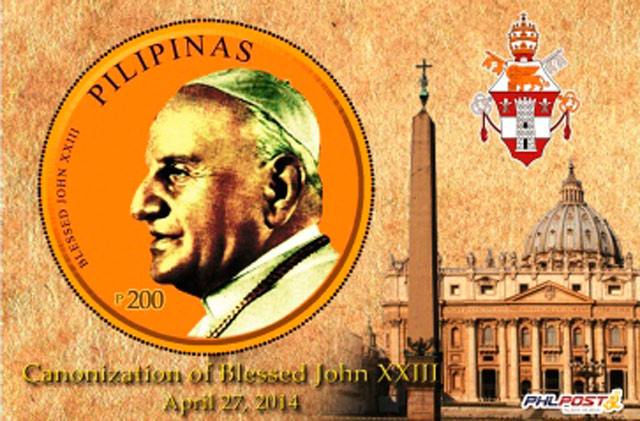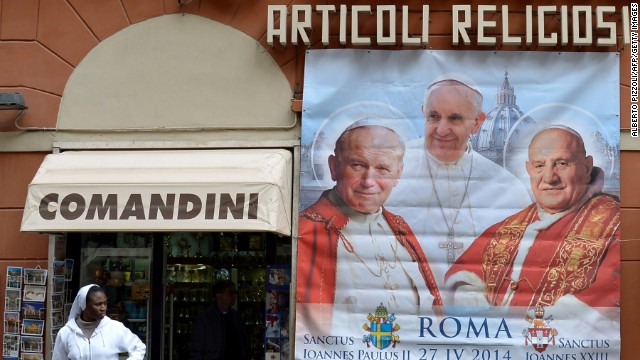
Posted on 04/27/2014 5:46:32 AM PDT by NYer
Pope Francis’ sermon for the canonization. Some analysis to follow.
At the heart of this Sunday, which concludes the Octave of Easter and which John Paul II wished to dedicate to Divine Mercy, are the glorious wounds of the risen Jesus.
He had already shown those wounds when he first appeared to the Apostles on the very evening of that day following the Sabbath, the day of the resurrection. But Thomas was not there that evening, and when the others told him that they had seen the Lord, he replied that unless he himself saw and touched those wounds, he would not believe. A week later, Jesus appeared once more to the disciples gathered in the Upper Room, and Thomas was present; Jesus turned to him and told him to touch his wounds. Whereupon that man, so straightforward and accustomed to testing everything personally, knelt before Jesus with the words: “My Lord and my God!” (Jn 20:28).
The wounds of Jesus are a scandal, a stumbling block for faith, yet they are also the test of faith. [May I add also that there are hard teachings which we must accept if we are to remain Christians? I have in mind, among others, the Lord's teaching about marriage, to which the Church has] That is why on the body of the risen Christ the wounds never pass away: they remain, for those wounds are the enduring sign of God’s love for us. They are essential for believing in God. Not for believing that God exists, but for believing that God is love, mercy and faithfulness. Saint Peter, quoting Isaiah, writes to Christians: “by his wounds you have been healed” (1 Pet2:24, cf. Is 53:5). [It is a great mystery that, even through Christ conquered death definitively, once for all time, we still have to die.]
John XXIII and John Paul II were not afraid to look upon the wounds of Jesus, to touch his torn hands and his pierced side. [As Christ said and John Paul famously repeated, "Do not be afraid."] They were not ashamed of the flesh of Christ, they were not scandalized by him, by his cross; they did not despise the flesh of their brother (cf. Is 58:7), because they saw Jesus in every person who suffers and struggles. These were two men of courage, filled with the parrhesia of the Holy Spirit, and they bore witness before the Church and the world to God’s goodness and mercy.
They were priests, bishops and popes of the twentieth century. [Let us not forget the indignities and sufferings they experienced as children, lay men!] They lived through the tragic events of that century, but they were not overwhelmed by them. For them, God was more powerful; faith was more powerful – faith in Jesus Christ the Redeemer of man and the Lord of history; the mercy of God, shown by those five wounds, was more powerful; and more powerful too was the closeness of Mary our Mother.
In these two men, who looked upon the wounds of Christ and bore witness to his mercy, there dwelt a living hope and an indescribable and glorious joy (1 Pet 1:3,8). The hope and the joy which the risen Christ bestows on his disciples, the hope and the joy which nothing and no one can take from them. The hope and joy of Easter, forged in the crucible of self-denial, self-emptying, utter identification with sinners, even to the point of disgust at the bitterness of that chalice. Such were the hope and the joy which these two holy popes had received as a gift from the risen Lord and which they in turn bestowed in abundance upon the People of God, meriting our eternal gratitude.
This hope and this joy were palpable in the earliest community of believers, in Jerusalem, as we read in the Acts of the Apostles (cf. 2:42-47). It was a community which lived the heart of the Gospel, love and mercy, in simplicity and fraternity.
This is also the image of the Church which the Second Vatican Council set before us. John XXIII and John Paul II cooperated with the Holy Spirit in renewing and updating the Church in keeping with her pristine features, those features which the saints have given her throughout the centuries. Let us not forget that it is the saints who give direction and growth to the Church. In convening the Council, John XXIII showed an exquisite openness to the Holy Spirit. He let himself be led and he was for the Church a pastor, a servant-leader. This was his great service to the Church; he was the pope of openness to the Spirit. [Since last July I have been saying that this canonization of the two Popes is also the canonization of the Second Vatican Council.]
In his own service to the People of God, John Paul II was the pope of the family. He himself once said that he wanted to be remembered as the pope of the family. I am particularly happy to point this out as we are in the process of journeying with families towards the Synod on the family. It is surely a journey which, from his place in heaven, he guides and sustains. [All of you should note that reference to the Synod. I know that the Cardinals and Bishops present heard that.]
May these two new saints and shepherds of God’s people intercede for the Church, so that during this two-year journey toward the Synod she may be open to the Holy Spirit in pastoral service to the family. May both of them teach us not to be scandalized by the wounds of Christ and to enter ever more deeply into the mystery of divine mercy, [NB!] which always hopes and always forgives, because it always loves.
Some analysis is in order.
First, the sermon was the right length. One could have been tempted to touch too many bases. You cannot do justice to the lives of those two men in a sermon. Less is more.
So, if the sermon really wasn’t about these Popes, what was it about? Rather, what was it also about?
Next, it seems to me that there was carefully woven into this sermon a subtle message about changes that will be proposed at the upcoming Synod which could be a “scandal” to many. On the one hand, many would be tested when the Synod recommends to uphold what we have taught and done for so many centuries. The reaffirmation of the Church’s teaching in clear terms would be hard and a stumbling block for those who have caved into what the world presses us to do in our weakness. On the other hand, were the Synod Fathers to make a recommendation clearly against what the Lord and Church has taught… well… scandal doesn’t begin to paint the picture of what would result.
Francis’ talk about forgiveness underscores my view.
That said, Francis stressed the Synod. He connected these two high voltage figures, as well as the overarching concept of “The Council” to the work of the Synod. Seen in this light, the short sermon didn’t need to focus on the two Popes, because it was really about something else.
Worshiping MAN? Perhaps in the snippets you missed, is this one.

The pope is holding in his hands, the Body, Blood, Soul and Divinity of Jesus Christ. They are worshiping God, not man. The priests were dressed in vestments, as commanded by God. There's nothing unscriptural about vestments. God commanded that they be used in the Old Testament. Look at Exodus 28:2:
For your brother Aaron you will make sacred vestments to give dignity and magnificence. You will instruct all the skilled men, whom I have endowed with skill, to make Aaron's vestments for his consecration to my priesthood. These are the vestments which they must make: a pectoral, an ephod, a robe, an embroidered tunic, a turban, and a belt. They must make sacred vestments for your brother Aaron and his sons, for them to be priests in my service. They will use gold and violet material, red-purple and crimson, and finely woven linen.
Nothing in the New Testament requires abolition of priestly vestments. Our Lord attacked the Jewish leaders for a number of sins, but he never condemned their priestly garb.
Didn't Jesus take Temple worship, and the accompanying "pomp and circumstance," seriously?
And Temple worship, with the Ark of the Covenant reserved in the Holy of Holies, was a type for Christian worship, with the Body and Blood of Christ reserved in the church's tabernacle.
If "pomp and circumstance" was appropriate for Temple worship, it would certainly be appropriate for Christian worship.
Remember that on your next birthday.
Simply put, Jesus is very, very happy today that two saints of God, their title(s) as saints is NOW offical, what people have KNOWN for years that both John XXIII and John Paul II are both SAINTS. This gives witness to the good news of the Gospel as witness to those who are non-believers and for believers, a call to holiness in life.



Disclaimer: Opinions posted on Free Republic are those of the individual posters and do not necessarily represent the opinion of Free Republic or its management. All materials posted herein are protected by copyright law and the exemption for fair use of copyrighted works.